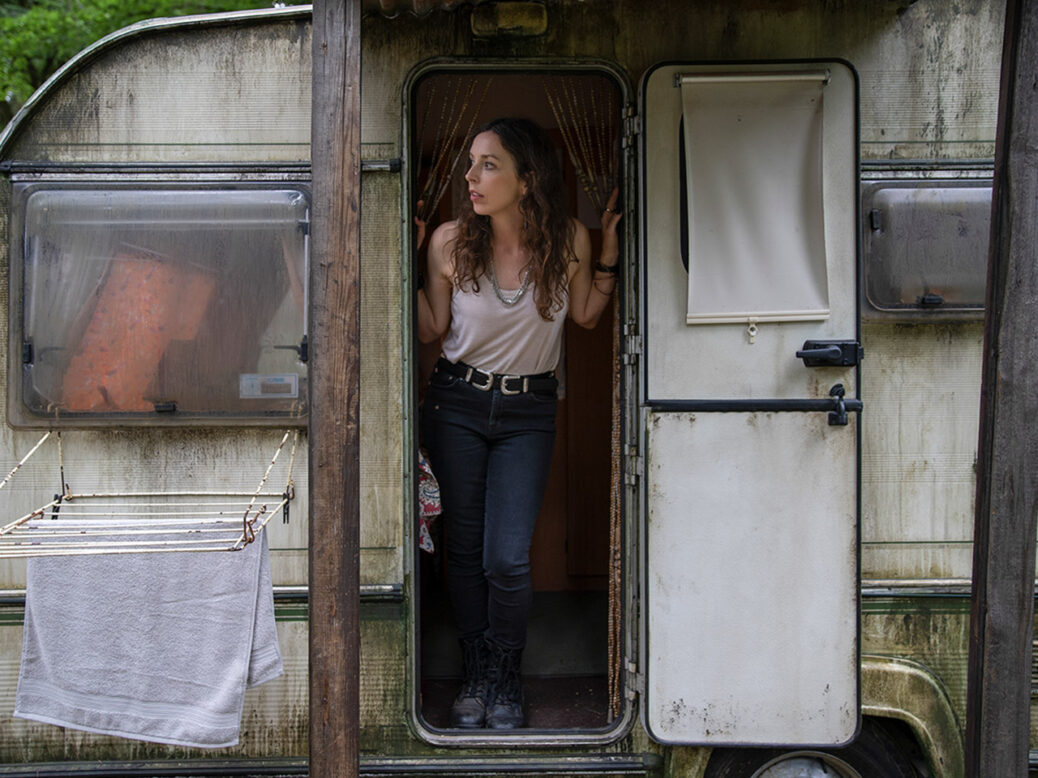
What is it with Channel 4 and the menopause? Having forced Davina McCall on the middle-aged women of this poor, benighted nation – McCall has discovered HRT, in case you hadn’t heard – it has now given us The Change, a six-part comedy-drama-thing in which a 50-year-old shop assistant called Linda throws everything up for an adventure in a filthy caravan in the Forest of Dean.
I’m not saying I’m ungrateful for the shift in tone. Give me Bridget Christie, who wrote and stars in The Change, any day of the week over McCall and her washboard stomach. At least she doesn’t look like she spends every spare second doing star jumps in front of her washing machine. But henceforth it really should be illegal to insist the menopause is a taboo subject. Some people talk of nothing else from dawn to dusk – and yes, since you ask, I feel saner than ever, thanks.
I like The Change a lot, but it is incredibly weird. Christie has called it “The Deer Hunter meets Shirley Valentine meets Deliverance meets Detectorists”, a meaty description that still takes us only about halfway there.
[See also: Shane Meadows’ The Gallows Pole has plenty of vomiting and swearing – but very little drama]
It reminds me of The League of Gentlemen, in the sense that once Linda has swapped her teenage children and boorish husband, Steve (Omid Djalili), for her sylvan retreat she finds herself in a strangely enclosed world: a place somewhat out of time, and peopled by ghouls and grotesques. Unlike Royston Vasey, however, this is basically a benign realm: a picaresque sovereign state in which a girl might quietly find both herself and (perhaps) a time capsule she hid inside a tall tree as a child.
Linda’s bolt is provoked by her 50th birthday party, at which the best thing Steve can find to say about her is that she is “well fit” for her age. But it has been bubbling for a while, its cauldron a series of notebooks in which, throughout the long decades of her marriage, she has recorded with utmost precision all the time she has spent folding underpants, dusting lampshades and faffing with Tupperware (also, having sex with Steve, eg: “one minute, 20 seconds”). She would now like some of that lost time back – about 44,000 minutes should do it, she thinks – and so, off she goes, on her old motorbike. Steve will just have to cope on his own, or go feral. No prizes for guessing which option he chooses, the stinker.
Having roared into a village somewhere far out west, Linda responds to an ad for a luxury caravan. Its owners are the Eel Sisters (Monica Dolan and Susan Lynch), who make a living serving said fish and mash “to men”. These two are half-crazed (though with what, I cannot yet say), their so-called caravan is a burnt-out shithole in which their father died, and they appear to be part of some kind of feminist folk plot that is now afoot. At this year’s Eel Festival, the Eel King will be an Eel Queen if they’ve anything to do with it.
Also in on this plot is Joy (Tanya Moodie), who broadcasts her emancipatory phone-in via the village’s community radio station. But there are blokes about, too. Tony (Paul Whitehouse) is the kind of man to whom, in the pub, Linda no longer wants to have to listen, but does anyway, because he’s decent and nice; Pig Man (Jerome Flynn) lives underground in the forest, and makes coffee so good it’s revelatory.
Like most comedy dramas, The Change is often neither one nor the other, though I did laugh when we saw the results of Joy’s life drawing class, for which Tony models. Talk about eels! And a mystery is undoubtedly burgeoning. We do not know what, precisely, might lie at its heart, save that it will probably involve male entitlement, the greatest and hardest-to-solve puzzle of all. But already we sense that deciphering it will bring Linda good fortune, and that this is as it should be.
I like Linda, who’s smart enough to grasp – oh, God, do I have to say the word again? – that in the end, the menopause may signal freedom. Those hot nights herald a woman’s right to be more fully herself, and (perhaps) to cease folding other people’s pants forever.
The Change
Channel 4, 21 June, 10pm; now on catch-up
[See also: BBC One’s Best Interests captures the horror of parental grief]
This article appears in the 21 Jun 2023 issue of the New Statesman, The AI wars





